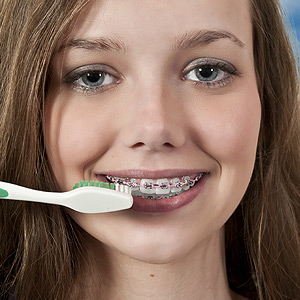A Little Extra Effort Can Make Brushing and Flossing with Braces Easier
 Moving teeth through orthodontics is more than a “smile makeover” — it’s also an investment in yours or a family member’s future oral health. Normally aligned teeth function better and are easier to keep clean and healthy.
Moving teeth through orthodontics is more than a “smile makeover” — it’s also an investment in yours or a family member’s future oral health. Normally aligned teeth function better and are easier to keep clean and healthy.
Ironically, though, the same appliance that helps enhance future oral health can also make it harder to keep the mouth healthy in the here and now. This is because fixed orthodontic hardware like braces can impede a patient’s ability to reach tooth surfaces while brushing or flossing to remove plaque. This thin biofilm of food remnant and bacteria can build up on tooth surfaces and cause tooth decay or periodontal (gum) disease.
It’s therefore not uncommon for people wearing braces to have two to three times the plaque on their teeth. This is especially problematic for younger patients whose newly erupted permanent teeth don’t have the resistance of older teeth to the acid that causes tooth decay.
While maintaining effective hygiene during braces is difficult, it isn’t impossible. There are a number of things that can be done to improve plaque removal. When brushing use a soft bristle, multi-tufted brush, which is more flexible for reaching around hardware. Be sure to take the time to brush above and below each braces wire all the way around, then on the inside of the teeth and the biting surfaces. If there’s difficulty reaching between teeth with regular flossing techniques, consider using a special floss holder or invest in a “water” flosser that sprays water under a pulsing pressure to remove plaque between teeth.
It’s also a good practice to eat a diet rich in fresh fruits, vegetables and dairy products and low on snacks with added sugar, a prime food source for bacteria. Use fluoride toothpastes and antibacterial mouth rinses to help strengthen enamel and reduce bacteria. Continue regular visits to the family dentist for dental cleanings to remove hard to reach plaque and calculus (hardened deposits) and monitor for disease.
It may take a little extra time and the aid of a few new tools, but your efforts will make a difference. You or your loved one will be taking care of their teeth now, while the braces take care of their health and smile tomorrow.
If you would like more information on hygiene practices during orthodontic treatment, please contact Dr. Cindy Sumarauw at 801-281-3500 to schedule an appointment for a consultation. You can also learn more about this topic by reading the Dear Doctor magazine article “Caring for Teeth During Orthodontic Treatment.”


Leave a Reply